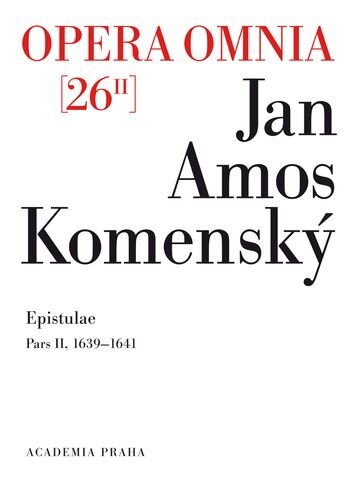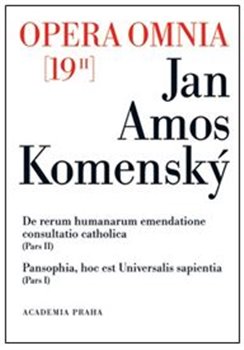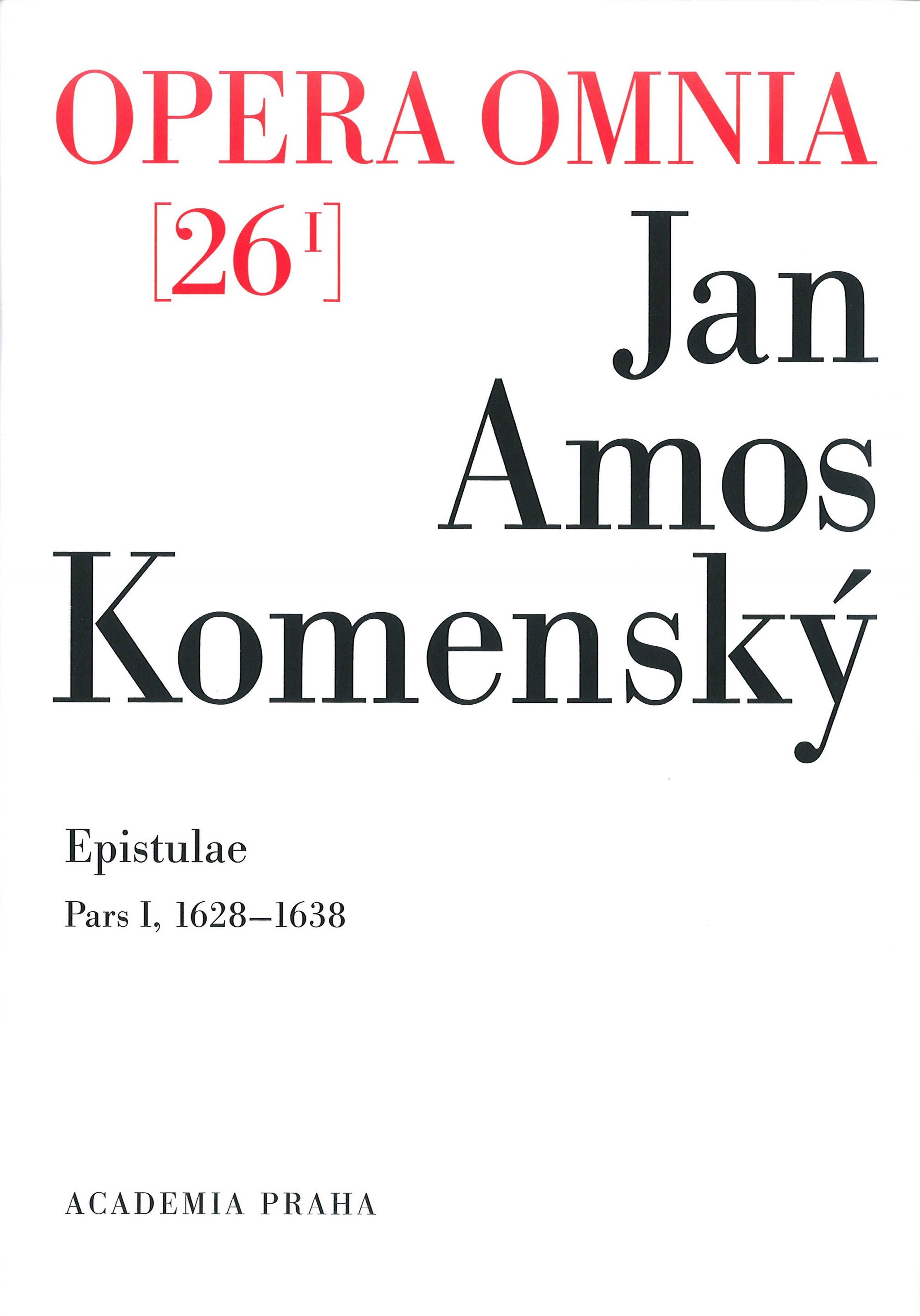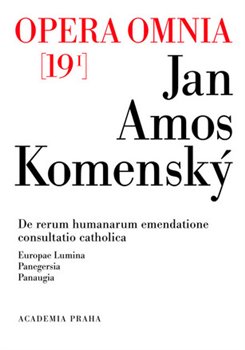J. A. Comenii Opera omnia
The work of Johannes Amos Comenius represents a unique collection of works of several genres in the history of the Czech nation and its science and culture, from scientific treatises to spiritual and secular poetry. Its author expressed himself skillfully both in Latin, which was the means of communication in the world of international relations and science of the time, and in his Czech mother tongue, in which he addressed his nation and his church - the Unity of Brethren, scattered in exile - throughout his life, but especially in tense historical moments. On occasion, Komenský also wrote in German, and for didactic purposes also in Old Greek; according to contemporary testimonies, he was also able to express himself in Polish (e.g. as a preacher; however, no work by Komenský has survived in this language).
Comenius' extensive literary legacy extends to almost every conceivable field in his time: he was a philosopher, educator, linguist, literary theorist, naturalist, theologian, political and social thinker, and historian. He lived the problems of the contemporary world, and in his work he tirelessly sought their solution. All of this, of course, in addition to his undeniable and more or less ubiquitous literary values, has left a mark on national cultural history that is so unmistakable that several generations have recognized the need to treat his work as a cultural monument of paramount importance and to complete his care with a scholarly critical edition of all his works. Among the personalities of the earlier period of Czech literature, such attention can be enjoyed by M. Jan Hus or Josef Dobrovský, for example, alongside Komenský, and in the wider European and world context Komenský ranks alongside Erasmus of Rotterdam or Francis Bacon.
Comenius' literary legacy is preserved in prints and manuscripts dating mostly from the period of his life and work, i.e. from 1612-1670, but in some cases also from the 18th century. In most cases, therefore, these are part of collections that are now particularly protected and often not easily accessible, so that scholarly critical editions, by providing authentic texts of these monuments, make the work of the author in question accessible to a wider range of interested parties, without any risk of harm to the original source materials. In addition to their research purposes, however, they also fulfil an important cultural and historical role. In both of these areas, it fits not only into the concept of the Institute of Philosophy of the CAS, v. v. i., of which the Comenius team is a part, but also into the Academy of Sciences of the Czech Republic.
The publication of Comenius' writings has undergone various peripetitions since its beginnings (already during the lifetime of its author), both in terms of formal processing and changing interests and emphases, focusing on various thematic sections of his work. After several editions of Komenský's writings - to varying degrees, including several multi-volume editions in Bohemia, Germany, and also, for example, in Russia - those interested in Komenský's thought have so far seen two serious attempts at a comprehensive edition based on scientific foundations. The first was All the Writings of Johannes Amos Comenius (Czech abbrevation VSJAK), published by the Central Association of Teachers' Units in Moravia in 1910-1929 (or 1938, when the second edition of part of volume 4 was published), the second is Johannis Amos Comenii Opera omnia - The Works of Johannes Amos Comenius (Czech abbrevation DJAK), published since 1969 by the Czechoslovak Academy of Sciences (ČSAV) and since 1992 by the Academy of Sciences of the Czech Republic (AV ČR) in its publishing house Academia. The publishers of VSJAK managed to publish 8 volumes out of the planned 30. While after the First World War the publishing was temporarily resumed, after the Second World War the edition was not continued despite the efforts of interested researchers. However, a few years after the founding of the Czechoslovak Academy of Sciences, i.e. in the late 1950s, the idea of a comprehensive critical edition of Comenius' works was born again, and after the necessary discussion in state and academic bodies, a workplace was established for the new edition (then within the Institute for the Czech Language, since 1971 it has been part of the J. A. Comenius, and since 1990 it has been operating within the Philosophical Institute of the Czech Academy of Sciences), Comenius' works were subjected to a thorough study, on the basis of which rules were developed for a truly critical edition of Comenius' writings as texts conceived in early modern Czech, Latin and German. In 1969, the first volume of the DJAK edition was published, the 16 volumes of which represent the largest collection of critically published texts by J. A. Comenius to date, and which, in addition, has already made available several previously unpublished or not easily accessible texts by Comenius (e.g. two Latin grammars, the Lexicon januale, writings on perpetual motion, Clamores Eliae).
_______________
Literature:
Novák, J. V. - Hendrich, J. Jan Amos Komenský – Jeho život a spisy. Praha 1932
Škarka, A. Jan Amos Komenský. In Dějiny české literatury I: Starší česká literatura. Praha, 1959, pp. 412-454
Blekastad, M. Comenius: Versuch eines Umrisses von Leben, Werk und Schicksal des Jan Amos Komenský. Oslo - Praha, 1969
Steiner, M. Kritische Editionen des komplexen Werkes J. A. Komenskýs. Acta Comeniana, 9 (1991), p. 175nn.
Zíbrt, Č. - Volf, J. Bibliografie české historie V. Praha, 1912 (nos. 17324-23266)
Brambora, J. Knižní dílo Jana Amose Komenského: Studie bibliografická Praha, 1954 (19572); idem: Komenskýs literarische Tätigkeit in Form von Medaillons dargestellt. In Jan Amos Comenius: Geschichte und Aktualität 1670-1970. Glashütten, 1971, vol. 2
Bohatcová, M. Jan Amos Komenský: Soupis rukopisů. Praha, 1957
Urbánková, E. (ed.). Soupis děl J. A. Komenského v československých knihovnách, archivech a museích. Praha, 1959
Brtová, B. - Vidmanová, S. Seznam děl J. A. Komenského uchovaných pouze v zahraničí (tisky do r. 1670). Studia Comeniana et Historica, 8 (1978), 18, p. 123nn.
Steiner, M. Antonín Škarka a Dílo Jana Amose Komenského, in: Jako bych se octl na obrovském staveništi. Antonín Škarka (14. 2. 1906 –12. 11. 1972), Tomáš Havelka, Andrea Hlaváčová Svobodová, Matouš Jaluška (ed.), in print.




